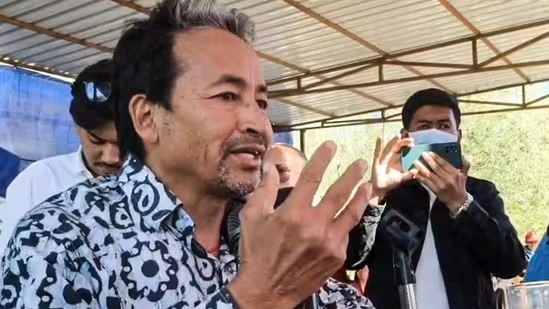Sonam Wangchuk has been blamed by the MHA for the unrest and canceled his NGO’s FCRA registration, alleging funding violations, which he denies.
In a dramatic escalation of long-simmering tensions in India’s high-altitude border region, renowned climate activist and educator Sonam Wangchuk was arrested by Leh Police on Friday, just three days after violent clashes rocked the picturesque town of Leh. The arrest, which comes amid accusations of inciting mob violence, has ignited fresh debates over the fragile balance between democratic dissent and national security in Ladakh, a Union Territory (UT) carved out of Jammu and Kashmir in 2019.
The protests, which claimed four lives and left over 80 injured, underscores the deepening frustrations among Ladakh’s predominantly Buddhist population. Protesters, including a surging wave of Gen Z youth, have been demanding full statehood for the region, inclusion under the Sixth Schedule of the Indian Constitution for tribal autonomy, and robust safeguards for its unique ecology and cultural heritage. Wangchuk, a Ramon Magsaysay Award winner in 2018 and founder of the Students’ Educational and Cultural Movement of Ladakh (SECMOL), has been at the forefront of this movement, leading multiple hunger strikes to amplify these calls.
The Spark: From Peaceful Fast to Fiery Chaos
The immediate trigger for the violence traces back to September 10, when Wangchuk launched a high-profile hunger strike in Leh, joined by dozens of supporters from the Leh Apex Body (LAB) and Kargil Democratic Alliance (KDA). This was his fifth such fast in three years, a testament to the unrelenting push for constitutional protections that protesters argue were promised but never delivered after Ladakh’s bifurcation as a UT. The demands are multifaceted: beyond statehood and Sixth Schedule status—which would grant autonomous councils with legislative powers over land, forests, and tribal affairs—activists seek the establishment of a Ladakh Public Service Commission for local job reservations, additional Lok Sabha seats, and protections against demographic changes that could dilute the region’s indigenous identity.
Tensions boiled over on September 24, the day Wangchuk broke his 15-day fast following the hospitalization of fellow protesters due to health complications. What began as a peaceful rally demanding dialogue with the central government descended into anarchy when unruly mobs clashed with security forces. Eyewitness accounts describe stone-pelting at Central Reserve Police Force (CRPF) personnel, the torching of a CRPF vehicle—nearly trapping jawans inside—and arson attacks on the local BJP office and LAB headquarters. Protesters also vandalized the vehicle of Ladakh’s Director General of Police (DGP), Ossie Noronha.
In a bid to quell the mayhem, security forces resorted to firing in self-defense, resulting in the deaths of four protesters and injuries to at least 87 others, including several Nepalese nationals and residents from Doda in Jammu who were participating in the demonstrations. The injured were rushed to SNM Hospital in Leh, where FIRs have been filed against some for their alleged roles in the violence. Authorities swiftly imposed a strict curfew in Leh town, extended to Kargil on Thursday evening, with internet services suspended and heavy deployments of paramilitary forces to prevent further escalation.

Arrest and Accusations: MHA Points Finger at Wangchuk
Leh Police confirmed Wangchuk’s arrest around 2:30 PM on Friday, led by DGP S.D. Singh Jamwal, under stringent sections including potential invocation of the National Security Act (NSA). Multiple FIRs were registered against him for “inciting protesters to violence,” with the Union Ministry of Home Affairs (MHA) issuing a scathing statement hours after the clashes, holding him directly responsible for the “disruption of law and order.” The MHA alleged that Wangchuk’s “provocative statements,” including references to Arab Spring-style uprisings, fueled the mob frenzy that turned a border area’s tranquility into a battlefield.
Compounding the charges, the MHA announced the immediate cancellation of SECMOL’s Foreign Contribution Regulation Act (FCRA) registration, citing violations of funding norms. A Central Bureau of Investigation (CBI) probe had earlier flagged unapproved remittances worth Rs 1.5 crore from international entities, including UN agencies, Swiss, and Italian organizations—transactions Wangchuk insists were legitimate business dealings with all taxes paid. “They mistook it as foreign contributions. I consider it a mistake on their part,” Wangchuk told reporters on Thursday, dismissing the move as a “scapegoat tactic” to sideline genuine grievances. He has vehemently denied incitement allegations, emphasizing that his activism has always been non-violent and aimed at protecting Ladakh’s fragile Himalayan ecosystem from unchecked development.
A Storied Activist’s Shifting Stance
Wangchuk’s journey from celebrated innovator to polarizing figure is deeply intertwined with Ladakh’s political evolution. In 2019, when the BJP-led government abrogated Article 370 and reorganized Jammu and Kashmir, Ladakhis, including Wangchuk, hailed the move as emancipation from Srinagar’s dominance. He spearheaded welcome campaigns, viewing UT status as a step toward self-governance. However, unfulfilled promises—such as land rights protections and local employment quotas—soured the mood. By 2020, Wangchuk pivoted to protests, organizing the “Ladakh for Future” campaign against industrial projects threatening glaciers and biodiversity hotspots.
His global acclaim stems from grassroots education reforms, like SECMOL’s alternative schooling model that inspired Aamir Khan’s character in the 2009 film 3 Idiots. Yet, critics, including some on social media, now brand his demands “noble on paper, dangerous in reality,” arguing that Sixth Schedule autonomy could hamstring India’s strategic control over this China-bordering terrain. On X (formerly Twitter), reactions are polarized: supporters decry the arrest as “unfortunate” and a blow to peaceful activism, while others hail it as essential for restoring peace, accusing Wangchuk of anti-national agitprop.
Jammu and Kashmir Chief Minister Omar Abdullah called the detention “unfortunate,” urging dialogue over crackdowns. Meanwhile, stalled talks between the central government and Ladakh’s apex bodies highlight a trust deficit, with protesters vowing the movement’s continuity despite Wangchuk’s jailing.

